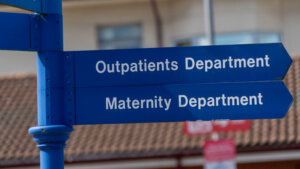Insulin overdose in hospitals due to limited staff knowledge

Contact
Table of Contents
A century ago, insulin was first used to treat a 14-year-old boy dying of type 1 diabetes. A hundred years later, people with type 1 diabetes, and some with type 2, are injecting insulin to manage their condition.
The Importance of Proper Insulin Administration
Administering insulin needs to be done safely using a pen device to regulate blood glucose levels. The right amount needs to be given, as giving a diabetic person too much insulin will result in hypoglycaemia which can be very dangerous if not treated correctly.
Investigation into Use of High-Strength Insulin
The HSIB (Healthcare Safety Investigation Branch) recently investigated the administration of high-strength insulin in hospitals as part of a national report. This focussed on a 73-year-old type 2 diabetic patient who was using a high-strength insulin which was 5 times stronger than most insulins, imported from the USA. This was administered using a pen and was used as the patient needed a lot of insulin to be given in a smaller dose. After being admitted to hospital for reasons unrelated to diabetes, the patient had their insulin withdrawn from their pen device with a syringe and the needle was injected to the patient, as opposed to using the pen device. This was done twice and meant she had too high a dose of insulin each time and suffered hypoglycaemia (low blood sugar).
The Role of Hospital Staff in Insulin Safety
The national investigation focussed on this case study, and stated that administering insulin by extracting it from a pen device with a syringe is a “never event” (i.e. it should never happen). It is clear from this that insulin administration in hospitals needs very careful management, especially regarding high-strength insulins in pen devices. Staff knowledge here is crucial, as they must be aware and familiar with different strengths of insulins, as well as pen devices. This was found to not be the case in this instance, and many staff members were unaware of the usual procedure, or unfamiliar with different insulin types (especially as many more enter the market.)
Safeguards need to be put in place
Safeguards need to be in place to support the administering of high-strength insulin, as well as employing expert diabetes staff in hospitals for the management of diabetic patients. Training must also be implemented Trust wide as diabetes encroaches on many departments within a hospital, and staff within each department must be aware of the procedure to avoid inflicting harm.
Dangers of Insulin Overdoses
There were 11 overdoses of insulin recorded due to incorrect administration between April 2017 and March 2022. The HSIB investigation made many observations aimed at improving the safety of diabetic patients in hospitals, focussing on the use of high strength insulin, staff knowledge and equipment.
Omnipod malfunction results in death
Overdoses of insulin can lead to harm or even death, as seen in the tragic fatal negligence case of a 5-year-old boy in 2019 who was given ten times the amount of insulin by a junior doctor in Rotherham. Another case relating to an Omnipod device was the death of Paul McNairney. He was found unresponsive at home in November 2021 after his Omnipod device is believed to have malfunctioned before delivering him 4 days’ worth of insulin in less than and hour while he slept, read here. Omnipod removed the need for Paul McNairney to inject himself with insulin 4 times per day.
While this report does not make any express recommendations, it is hoped that the observations made will lead to positive change – meaning a brighter, safer future for diabetic patients visiting hospitals.
NHS Complaints
If you have concerns about diabetes management or any other treatment received under the NHS, it’s important to know how you can voice these concerns effectively. The NHS has a structured complaints procedure that allows patients or their families to raise concerns about the care they have received. Whether it’s an issue with insulin administration or any other aspect of medical care, the NHS Complaints Procedure provides a formal way to ensure your grievances are heard and addressed.
Legal Advice and Support
If you’d like to speak to the medical negligence department regarding similar matters complete an online enquiry form. Our specialist lawyers can provide you with a free consultation to evaluate the circumstances of your claim.
Share this article
“Small but very effective and experienced team so every client benefits from the personal touch but also highly skilled litigation know-how. Capability of the team means they can handle all aspects of very complex cases as well as straightforward matters.”
“Osbornes Law is an established firm which handles a breadth of complex and high-value clinical negligence matters.”
Stephanie Prior leads the team with real experience and commitment to her clients. Able to spot a good case early on and see it through to conclusion.
Stephanie Prior leads a strong and competent team.
With 10 years of experience as a registered general nurse, stephanie is well placed to support clients through complex and sensitive claims.
Stephanie Prior ‘leads the team with real experience and commitment to her clients’
Osbornes has a skilled team of solicitors advising clients on a wide range of clinical negligence matters.
Hard working, approachable, good knowledge of clinical negligence and clients’ specific conditions
A joy to work with and always 100% client focused at all times.
The clinical negligence team at Osbornes is much lauded for its ability to ‘represent the diverse range of London-based clients
Ben Posford leads the catastrophic injury team and regularly represents claimants in neurological injury and fatal accident claims. He also has a niche specialism in claims involving cauda equina syndrome.
Stephanie Prior is head of the clinical negligence department at Osbornes Law. She acts on a wide range of issues, including claims for brain injuries sustained at birth and delays in diagnosis. She frequently represents clients in fatal claims involving surgical error.
"Stephanie Prior is very empathetic and practical, she gets to the heart of a case quickly."
"Stephanie Prior is highly respected in the marketplace, with a great wealth of experience, superb judgment and medical knowledge that is second to none."
"Stephanie has always shown great judgment and common sense whilst building valuable relationships with her opponents."
"Stephanie Prior is a standout solicitor."
"Stephanie Prior is an experienced lawyer with immense knowledge of her specialism, which allows her to run her cases with strategic precision."
"Stephanie knows her way effortlessly around any clinical negligence issue and has a great strategic mind."
"I know [we have] expressed our appreciation, but I also wanted to thank you for all your hard work, time and patience in pursuing mum’s claim through to a successful outcome - your kind and professional approach was genuinely appreciated."
“May I take this opportunity to thank you for your patience and true compassion in yet another very tough year of representation on the behalf of my wife. I certainly must say you did it all with amazing stamina and positivity which regenerated my self-esteem…. You honestly eased the pain and I can see a healing process ahead.”
Stephanie has developed a particularly strong reputation for her handling of birth injury claims, as well as cases concerning surgical negligence and delays in surgery.
"An excellent firm which achieves fantastic outcomes for clients."
"Stephanie Prior takes on complex cases and gets excellent results. She has a background in medicine which serves her clients well and is a realistic but tough litigator."
"Stephanie Prior is hugely dedicated, adored by her clients, tenacious, efficient and extremely knowledgeable."
"Stephanie Prior is very good with troubled clients and is easily able to make them feel at ease."
"Stephanie shows sensitivity and deals with things in an understanding way."
Osbornes provides a very intimate and personal client service which is increasingly rare in this sector.
The lawyers in the team are highly experienced and will drive cases very hard on behalf of their clients.
"Stephanie Prior has a realistic attitude to the complexities of the cases. She wins the trust of her clients and goes the extra mile to ensure they get the best outcomes."
Stephanie’s background in medicine gives her an ability to read between the lines where medical records and expert evidence are concerned and is a great asset.
"Her knowledge base is second to none and her understanding of the litigation process stands out, as does her ability to work collaboratively."
"Stephanie Prior... manages a varied caseload, including obstetric claims, child and adult brain injury cases and fatal and non-fatal spinal cord injury cases."
"Stephanie is experienced, knowledgeable of all aspects of clinical negligence work, and strategic in running cases."
"Key team members include the approachable, compassionate and efficient Stephanie Prior."
"Solid personal injury practice well equipped to advise on high-value and high-profile claims arising from fatalities and severe head and spinal injuries."
"Stuart is also very experienced in advising on fatal accidents and workplace accidents."
"The team were extremely professional in putting my needs first. There was a joined-up approach to catering for the client, and all lawyers involved were briefed and constructive."
Stephanie Prior is always very professional and kind. Highly recommended.
Quite simply excellent, with a highly competent and well-rounded team. They understand complex medical litigation and have been our lifesavers, and we will always owe them our immense gratitude.
Stephanie Prior is ‘very warm’ and ‘caring’, and an ‘exceptional professional’.
Stephanie Prior continues to receive widespread praise from clients, who state that she explains the legal aspects of the case very clearly, and she is also a caring person who handles cases on a personal level.
Stuart Kightley is praised for his expertise in catastrophic and fatal claims. Clients say he is very impressive, in terms of both his experience and his management of the personal injury team.
Related InsightsVIEW ALL
- 13.5.2025
Damages Recovered for Necrotic Pressure Sore
Elline Demetriou recovers damages following a necrotic pressure sore on her client’s heel Elline Demetriou, Solicitor in our clinical...
Read more - 12.5.2025
Complaints Against Suspended Surgeon Ms Kuldeep Stohr
Ms Kuldeep Stohr, orthopaedic surgeon at Addenbrooke’s Hospital suspended In February 2025, Cambridge University Hospitals NHS Foundation Trust (CUH) confirmed...
Read more - 6.5.2025
Six-Figure Settlement for Negligent C-Section Delivery
Osbornes secures a six-figure settlement following a negligent caesarean section delivery Jodi Newton, Partner and head of our Obstetric and...
Read more - 6.5.2025
Six-Figure Settlement for Negligent Shoulder Surgery
Settlement following a claim against Bedfordshire Hospitals NHS Foundation Trust Elline Demetriou, a Solicitor in our clinical negligence team, acted...
Read more - 29.4.2025
Five-Figure Settlement in Fatal Medical Negligence Case
Osbornes Law secures a five-figure compensation following a fatal medical negligence claim Osbornes acted for our client, E, who brought...
Read more - 4.4.2025
Time To Move On From Physician Associates?
BMA raises concerns over patient safety: the risks of Physician and Anaesthesia Associates in the NHS The British Medical Association (...
Read more - 13.3.2025
Addenbrooke’s Hospital Complaints
Review finds harm to children by surgeon at Addenbrooke’s Hospital An independent review by Cambridge University Hospitals NHS Foundation...
Read more - 4.2.2025
Claim Settled for Child’s Surgery Injuries
Osbornes secures settlement for child’s surgery-related injuries Osbornes Law successfully represented a minor, X, in a claim against two...
Read more - 29.1.2025
£27,000 DVT Claim Settled Against Royal Free London NHS
Successful settlement for DVT case against Royal Free London NHS Foundation Trust Successful Settlement of £27,000.00 for DVT Claim against Royal...
Read more - 14.10.2024
Multi-Million Settlement in Cerebral Palsy Negligence Case
Judge awards multi-million settlement in cerebral palsy medical negligence claim Jodi Newton, Partner and specialist medical negligence lawyer at Osbornes...
Read more - 19.9.2024
Report highlights failings in maternity care
The Care Quality Commission (CQC) has recently carried out a national review of 131 maternity inspections between 2022 and 2024, finding that failures...
Read more - 12.9.2024
Great Ormond Street Hospital Negligence & How to Claim
Review of negligence at Great Ormond Street Hospital At Osbornes Law, we’ve supported families through some of the most...
Read more - 29.8.2024
AB v Central London Community Healthcare NHS Trust
Background Our client, AB, had been using the Nexplanon contraceptive device for 6 years. She had a Nexplanon device inserted into...
Read more - 30.7.2024
What Is the Role Of a Physician Associate?
What does the Position of Physician Associate Mean for the NHS? There are many different jobs within the NHS, each...
Read more - 17.7.2024
Settlement for Delay in Wrist Fracture Treatment
Our Clinical Negligence team have recently agreed the settlement of a case relating to a delay in the treatment of...
Read more - 28.6.2024
£55,000 Settlement for Stillbirth Claim Against Chelsea and Westminster...
Successful Settlement for Stillbirth Claim Against Chelsea and Westminster Hospital NHS Foundation Trust Background Nick Leahy, an Associate in our...
Read more - 9.5.2024
Claim Against Royal Free London NHS Foundation Trust...
Client obtains settlement after being victim of a surgical negligence Jodi Newton, Partner in our Clinical Negligence department, recently settled...
Read more - 30.4.2024
Settlement In Neonatal Death Case
Settlement in fatal medical negligence case against King’s College Hospital Nick Leahy, Associate in our Clinical Negligence department, recently...
Read more - 8.4.2024
Epilepsy Negligence Compensation Claim
Nicholas Leahy, an Associate in the Clinical Negligence team at Osbornes Law, has recently settled a long-running fatal medical negligence...
Read more - 11.1.2024
New UK Supreme Court Ruling regarding Secondary Victims...
The Supreme Court has today, on the 11th January 2024, upheld the Court of Appeal’s order to dismiss the claims...
Read more - 11.1.2024
Secondary Victim Claims
Secondary victims in clinical negligence cases What is a secondary victim in clinical negligence cases? Most compensation claims are concerned...
Read more - 5.1.2024
Delayed Pre-Eclampsia Diagnosis Results in Loss of Baby
Introduction to the case Nick Leahy, Associate in our Clinical Negligence department, has recently settled a birth injury claim against...
Read more - 12.12.2023
NHS Compensation Payouts Guide
What Are NHS Compensation Payouts? In the UK, the National Health Service delivers the vast majority of healthcare services. When...
Read more - 23.11.2023
Claim against Bradford Teaching Hospitals NHS Foundation Trust
High-risk pregnancy following previous miscarriage Osbornes acted for a Claimant, C, in her birth negligence claim against Bradford Teaching Hospitals...
Read more


























